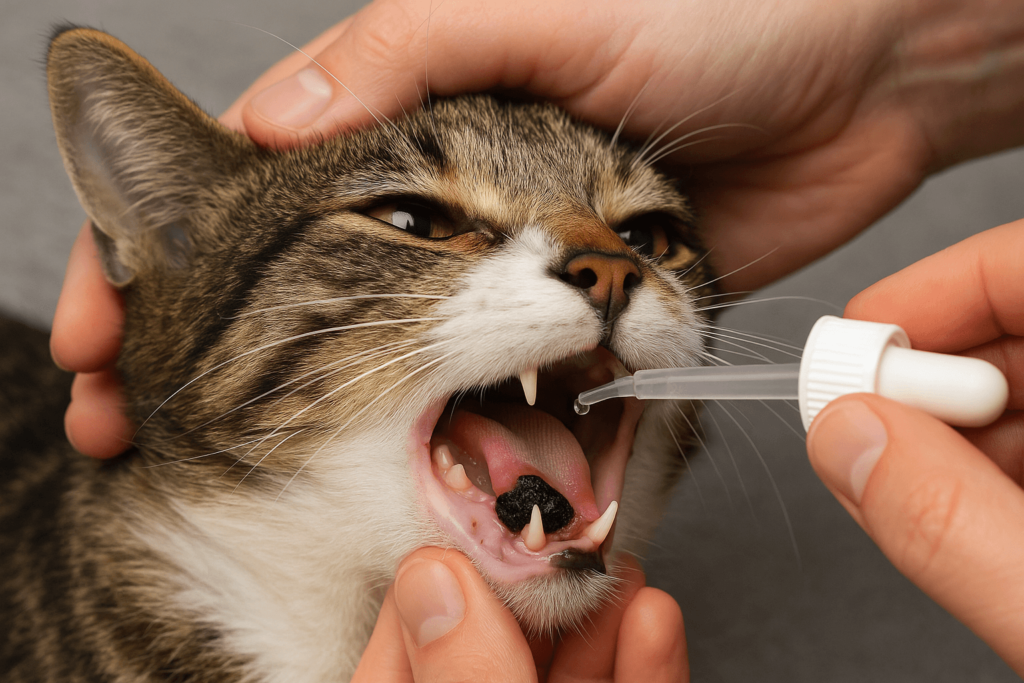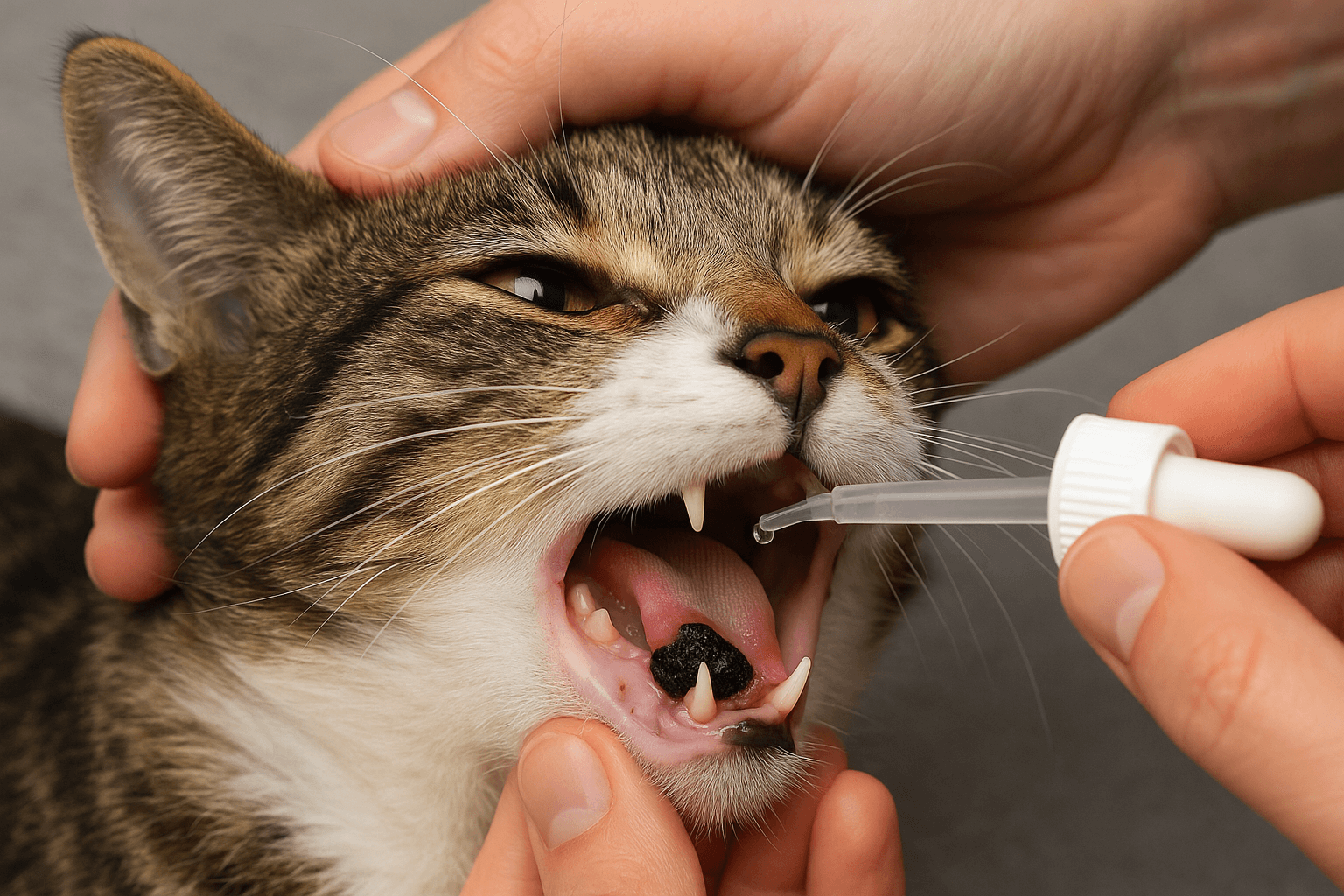Cat Mouth Black Fungus Treatment: What You Need to Know
A black fungus in your cat’s mouth can be alarming, but understanding its causes and treatment options can help you address the issue effectively. While not all cases of dark discoloration in a cat’s mouth are caused by fungal infections, it’s essential to rule out serious conditions like oral melanoma or other health concerns. This blog post will guide you through identifying symptoms, treating black fungus, and ensuring your feline friend stays healthy. With proper care and veterinary support, you can tackle this condition and restore your cat’s oral well-being.
Symptoms of Black Fungus in Cats
Recognizing the signs of black fungus in your cat’s mouth is the first step toward diagnosis and treatment. Look for these common symptoms that may indicate an underlying issue.
Dark Spots or Patches:
Black or discolored areas on the gums, tongue, or roof of the mouth could signal a fungal infection or other oral health problem.Bad Breath:
Persistent foul-smelling breath may accompany fungal infections due to bacteria thriving in the affected area.Difficulty Eating:
Cats with oral discomfort may avoid eating, chew on one side of their mouth, or show reluctance to eat hard food.Excessive Drooling:
Increased drooling can occur as a result of pain or irritation caused by the fungal growth.Swollen Gums:
Inflammation or swelling around the affected area may indicate an ongoing infection or immune response.
If you notice any of these symptoms, consult your veterinarian promptly to determine the cause and begin appropriate treatment.

Treatment Options for Cat Mouth Black Fungus
Treating black fungus in your cat’s mouth requires a combination of professional veterinary care and at-home management. Here are some effective approaches to consider.
Antifungal Medications:
Veterinarians often prescribe topical or oral antifungal medications to target the root cause of the infection.Dental Cleaning:
Professional dental cleanings can remove plaque and debris that may contribute to fungal growth in the mouth.Improved Oral Hygiene:
Regularly brushing your cat’s teeth with vet-approved toothpaste can help prevent future infections.Nutritional Support:
A balanced diet rich in vitamins and minerals boosts your cat’s immune system, aiding recovery from fungal infections.Monitoring Progress:
Keep track of changes in your cat’s mouth and report any worsening symptoms to your vet immediately.
With consistent care and follow-up, most cats respond well to treatment and regain their oral health.
Check this guide 👉Understanding Cat Mouth Cysts: Best 7 Expert Tips!
Check this guide 👉Why Is My Cat Sitting With Its Mouth Open? Best 7 Tips!
Check this guide 👉Cat Bleeding from Nose and Mouth: Best 7 Health Tips!
Prevention Tips for Oral Health | Signs That Require Immediate Vet Visit |
|---|---|
Brush your cat’s teeth regularly | Severe swelling or bleeding in the mouth |
Provide dental-friendly chew toys | Refusal to eat or drink for over 24 hours |
Schedule annual dental check-ups | Persistent bad breath despite cleaning |
Avoid feeding sugary or harmful foods | Visible ulcers or sores in the mouth |
Maintain a stress-free environment | Excessive pawing at the mouth or face |
How to Prevent Black Fungus in Your Cat’s Mouth
Preventing black fungus starts with proactive oral care and creating a healthy environment for your cat. These steps can reduce the risk of fungal infections and other oral health issues.
Regular Dental Check-Ups:
Schedule routine visits to the vet for comprehensive oral examinations and cleanings.Use Vet-Approved Products:
Choose toothbrushes and toothpaste designed specifically for cats to maintain their oral hygiene.Limit Stressful Situations:
Stress weakens the immune system, making cats more susceptible to infections. Ensure a calm living environment.Monitor Diet Closely:
Feed high-quality food and avoid ingredients that promote bacterial growth, such as sugar or artificial additives.Clean Food and Water Bowls Daily:
Wash bowls thoroughly to prevent mold or bacteria buildup that could harm your cat’s health.
By incorporating these practices into your routine, you can significantly lower the chances of black fungus affecting your cat.
Common Misconceptions About Cat Mouth Black Fungus
There are several myths surrounding black fungus in cats’ mouths that can lead to confusion. Clearing up these misconceptions ensures better care for your pet.
It’s Always a Fungal Infection:
Dark spots in the mouth aren’t always caused by fungi—they could indicate melanoma or other conditions requiring different treatments.Home Remedies Are Sufficient:
While natural remedies may complement professional care, they shouldn’t replace prescribed treatments from a vet.Only Older Cats Are Affected:
Younger cats can also develop fungal infections, especially if their immune systems are compromised.Antibiotics Treat All Mouth Issues:
Antibiotics target bacteria, not fungi, so using them incorrectly can worsen the infection.Black Fungus Is Rare:
Though less common than other oral issues, black fungus does occur and should be taken seriously.
Understanding these facts helps ensure accurate diagnosis and effective treatment for your cat.
Common Mistakes to Avoid
When dealing with black fungus in your cat’s mouth, avoiding certain mistakes can make treatment more effective and less stressful for your pet.
Delaying Veterinary Care:
Waiting too long to seek help can allow the infection to worsen, making treatment more challenging.Using Human Medications:
Over-the-counter human antifungals or antibiotics can harm your cat instead of helping.Skipping Follow-Up Appointments:
Missing vet visits prevents monitoring progress and adjusting treatment plans as needed.Neglecting Oral Hygiene After Recovery:
Failing to maintain good oral habits increases the risk of recurrence.Assuming Symptoms Will Resolve on Their Own:
Untreated fungal infections rarely resolve without intervention and can lead to complications.
Avoiding these errors ensures a smoother recovery process for your cat.
Supporting Your Cat During Treatment
Supporting your cat emotionally and physically during treatment can enhance their healing journey.
Provide Soft Foods:
Offer soft, easy-to-eat meals to minimize discomfort while chewing.Create a Quiet Space:
Allow your cat to rest in a peaceful area away from noise and disturbances.Offer Comfort Items:
Familiar blankets or toys can soothe your cat during stressful times.Administer Medications Correctly:
Follow your vet’s instructions precisely to ensure medications work effectively.Reward Positive Behavior:
Use treats or praise to encourage cooperation during treatments like brushing or administering medicine.
These supportive measures help your cat feel safe and cared for throughout the process.
When to Seek Emergency Care
While many cases of black fungus can be managed with routine treatment, some situations require immediate attention.
Severe Bleeding in the Mouth:
Significant bleeding indicates a serious issue that needs urgent veterinary care.Sudden Swelling of the Face or Jaw:
Rapid swelling could signal an abscess or severe infection requiring prompt treatment.Difficulty Breathing:
Labored breathing may suggest blockages or inflammation affecting airways.Lethargy or Collapse:
Extreme weakness or collapse signals a critical condition needing emergency intervention.Persistent Vomiting or Diarrhea:
These symptoms may indicate systemic effects of the infection or medication reactions.
Knowing when to act quickly can save your cat’s life and prevent further complications.
Frequently Asked Questions About Cat Mouth Black Fungus
What causes black fungus in a cat’s mouth?
It’s typically caused by opportunistic fungi, poor oral hygiene, or weakened immunity allowing infections to take hold.
Can I treat black fungus at home?
Home care can supplement treatment, but professional veterinary intervention is crucial for proper diagnosis and medication.
How long does treatment take?
Treatment duration varies depending on severity, but most cases improve within weeks with consistent care.
Is black fungus contagious to other pets?
Most fungal infections aren’t highly contagious, but maintaining hygiene prevents spreading potential risks.
What should I do if my cat stops eating?
Contact your vet immediately, as refusal to eat can lead to dehydration and further complications.
Prioritizing Your Cat’s Oral Health
Black fungus in a cat’s mouth is a manageable condition with timely diagnosis and proper treatment. By staying vigilant about your cat’s oral hygiene, recognizing early symptoms, and seeking veterinary assistance when needed, you can protect your feline companion from discomfort and long-term health issues. Remember, prevention is key—regular check-ups, a nutritious diet, and a clean environment go a long way in keeping your cat’s mouth healthy. With love and dedication, you can ensure your furry friend enjoys a happy, pain-free life.
Newfoundland Dog Personality: Best 7 Expert Tips! – Discover the gentle, loyal, and protective nature of this giant breed perfect for families.
Can Hot Pavement Burn Your Cats Paws? Best 7 Expert Tips! – Learn how to protect your cat’s paws from hot surfaces and prevent painful burns this summer.
Can Hot Pavement Burn Your Dogs Paws? Best 7 Expert Tips! – Learn how to protect your dog’s paws from hot surfaces and ensure safe summer walks.
Irish Wolfhound Size: Best 7 Expert Tips! – Discover the ideal height, weight, and care tips for this majestic giant breed. Learn how to manage their impressive stature responsibly.





